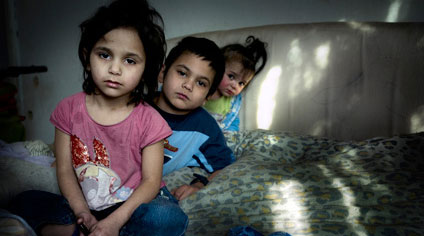
Education against hate
Claudia Santoro, MRG’s Communications intern, continues her series of blogs on discrimination against Roma in Europe and looks this time at initiatives to reverse the worrying trend of increased hostility and hate speech towards the region’s largest minority.
Hate speech used in the mayor of Milan’s electoral campaign was back in the news last week when the Council of Europe published Commissioner Thomas Hammarberg’s report about his visit to Italy.
He expressed his concern about ‘anti-Roma political discourse’, which ‘perpetuates anti-Gypsyism’ and recognised the need for political parties to establish a system of self-regulation to avoid racist behaviour. Among the interesting observations contained in the report, I strongly agree with the need to disseminate unbiased information about Roma, both to be used by journalists as background information for reporting on these issues and also to balance inaccurate coverage about Roma and Travellers, which enhances stereotypes and blocks integration with mainstream society.

Unfortunately in many EU countries where an anti-Roma/Sinti discourse is present in both the media and political arenas, discrimination follows. In his report Commissioner Hammarberg recalls examples of authorities using hate speech towards minorities in Hungary, Czech Republic, Denmark and France and warns that it ‘should not be underestimated’. It can encourage violence; in the Czech Republic for instance, following the Nový Bydžov Mayor’s public statements on Roma, extremist groups attacked a demonstration of Roma communities.
In the UK, the recent events at Dale Farm, led Janet Burden, the Rabbi of the West Central Liberal Synagogue & Ealing Liberal Synagogue, to compare the current persecution of Roma, Gypsies and Irish Travellers with the discrimination ‘Jews faced in the first half of the 20th century’ and, as reported in a recent Guardian article, she also drew attention to the fact that the language used about Roma ‘clearly echoes rhetoric of anti-Semitism’.
As Commissioner Hammarberg stated in his speech delivered at the Summit of Mayors on Roma, both media professionals and politicians ‘should avoid using stigmatising speech against the Roma and should not feed the age-old prejudices against this minority. Sweeping generalisations about Roma and Travellers, in particular concerning their involvement in crime, feed the false stereotypes’.
I think that the need to involve Roma representatives in mainstream societies’ public activities is the most powerful way to actively promote a conscientious approach towards this minority. Surely this must also include the recruitment of journalists with Roma and other ethnic backgrounds in order to contribute to a more diverse, higher standard of journalism?

The ‘Decade of Roma Inclusion’ (2005-2015) aims to improve Roma’s social inclusion through targeted projects such as the Roma Education Fund, which will develop educational opportunities for Roma communities. The guide ‘Beyond Rhetoric’ includes recommendations to the European Commission based on the experience of the Open Society Foundations as well as country-specific recommendations from independent experts.
Finally, Colorful but Colorblind is a project aimed at remedying anti-Roma stereotyping through the creative use of multimedia in European Union new member states in Central and Eastern Europe. It represents one of the many significant projects necessary to generate change which benefits culture and knowledge.
These initiatives turn words into actions: the creation of opportunities rather than discriminatory rhetoric is a path to create a conscious society. Skilled young Roma can help to eradicate stereotypes, but also mainstream society has to play a role in this integration process. Are we ready to end discrimination?
—
This article reflects the sole opinion of its author and does not engage MRG’s responsibility.